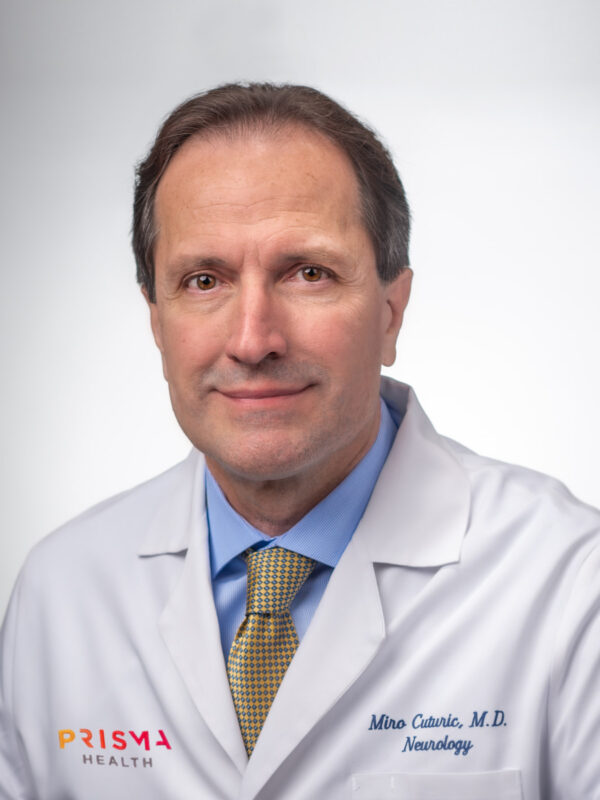What is Huntington’s disease?
Huntington’s disease is a neurological condition that causes nerve cells in the brain to gradually break down. Neurologist Miroslav Cuturic, MD, answered common questions about Huntington’s disease and how those with a family history can lessen their risk.
What causes Huntington’s disease?
“Huntington’s disease is a genetic condition,” said Dr. Cuturic. “It runs in families and is passed from parent to child. The child of someone with Huntington’s disease has about a 50% chance of inheriting the gene that causes it.”
Huntington’s disease is caused by a mutation in the gene for a protein called huntingtin. This mutation creates a defect in the building blocks of DNA, which causes abnormal protein buildup within the brain. As this buildup worsens, symptoms of the disease become apparent.
Having a parent diagnosed with Huntington’s disease doesn’t necessarily mean someone will also develop it or pass the mutation on to their own children. There have also been cases of sporadic Huntington’s disease, where there isn’t a past family history, although this is very rare.
How does Huntington’s disease affect your body and mind?
“The disease can cause trouble with movements and thinking,” said Dr. Cuturic. “Symptoms usually begin to appear when the affected person is in their thirties or forties, although they can begin in childhood or adolescence, which we call juvenile-onset HD. What seem like mild symptoms initially progress and become more severe with time.”
Symptoms of Huntington’s disease include:
- Depression, anxiety, irritability or other mental health concerns
- Twitching or involuntary movements (called chorea)
- Trouble retaining new information or making decisions
- Imbalance or struggling to walk
- Difficulty with speaking or swallowing
- Changes in personality
- Ongoing decline in the ability to reason or think
- Seizures may occur in juvenile-onset HD
How is Huntington’s disease diagnosed?
“Because the symptoms of the disease mimic many other neurological conditions, genetic testing is the gold standard in diagnosing Huntington’s disease, together with obtaining family history, medical history and physical exams,” said Dr. Cuturic.
Doctors look for symptoms and use a blood test to check for the gene mutation that causes the disease. The gene mutation can be identified by genetic testing even in healthy individuals many years before the illness starts. This is known as predictive testing.
How is Huntington’s disease treated? Is there a cure?
“Unfortunately, Huntington’s disease doesn’t have a cure or disease-slowing therapies,” said Dr. Cuturic. “However, researchers are diligently working to find new and promising treatments in the future.”
Currently, treatment is focused on treating symptoms and improving quality of life through physical, occupational and speech therapy, as well as counseling with a psychologist, geneticist, nutritionist and and social worker. Medications can be prescribed to help with movements and mood. Supportive care and counseling are essential for improving and maintaining quality of life after diagnosis.
Are there lifestyle changes you can make to help manage Huntington’s disease?
“Yes, lifestyle changes are very helpful in treating Huntington’s disease,” said Dr. Cuturic. “Regular exercise, a balanced diet and psychological counseling can measurably improve well-being for patients.”
Dr. Cuturic also emphasized the importance of avoiding tobacco use in all its forms, especially cigarette smoking, as well as avoiding the use of alcohol or recreational drugs, including cannabis and marijuana, as all these habits can worsen the progression of symptoms. Aerobic exercise can improve physical health in people with Huntington’s disease.
Can you continue working with Huntington’s disease?
“Yes, you can work with Huntington’s disease,” said Dr. Cuturic. “The type of work you do may need to be adjusted as symptoms progress, but employment is absolutely still possible.”
He noted that you should look for a work environment that is both able and willing to make necessary accommodations to work alongside you in managing your health and ongoing responsibilities. It is also important to be able to recognize at which point you may want to consider retiring or applying for disability.
If you’ve been diagnosed with Huntington’s disease, what should you ask your doctor?
“That initial diagnosis can be frightening,” said Dr. Cuturic. “Your physician is there to help you understand what you’ve been diagnosed with and what to do to adjust and adapt while undergoing treatment. You should ask questions to help you feel more comfortable and informed.”
Dr. Cuturic suggested asking your doctor about the disease’s prognosis, treatment options, symptom management and what support resources may be available to you moving forward. You may also find it helpful to speak with your doctor about what lifestyle changes and clinical trials can help manage or lessen symptoms.
Most importantly, sit down with your care team and trusted loved ones to talk about how to plan for the future.
Find a doctor
Whether you’re looking for a primary care physician or need to see a specialist, we’re here to help with experienced, compassionate care near you.
Find a Doctor

